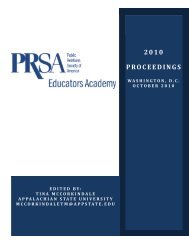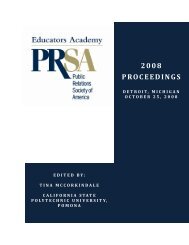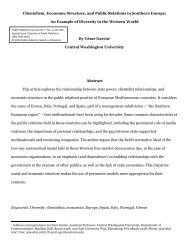2012 PROCEEDINGS - Public Relations Society of America
2012 PROCEEDINGS - Public Relations Society of America
2012 PROCEEDINGS - Public Relations Society of America
Create successful ePaper yourself
Turn your PDF publications into a flip-book with our unique Google optimized e-Paper software.
with work-life stresses, compared to those whose highest education was a master‘s degree (M =<br />
4.41, SD = 1.42) (mean difference = .409, SE = .137, p < .05).<br />
No significant main effects <strong>of</strong> accreditation or marital status were detected.<br />
Organizational Support on Coping Preferences<br />
RQ4.1 asked how immediate supervisor support is associated with PR practitioners‘<br />
work-life conflict coping preferences. Hierarchical regression, after partialing out the effects <strong>of</strong><br />
gender, age, years <strong>of</strong> public relations experience, and average daily work hours, indicated that<br />
immediate supervisor support served as a significant predictor for one type <strong>of</strong> work-life conflict<br />
coping: positive thinking (beta = .11, t = 2.40, p < .05) (F = 2.43, p < .05, adjusted R square<br />
= .02). More support from the immediate supervisor was associated with more positive thinking<br />
coping among employees.<br />
RQ4.2 asked how organizational work-life culture is associated with practitioners‘ worklife<br />
conflict coping preferences. Hierarchical regression, after partialing out the effects <strong>of</strong> gender,<br />
age, years <strong>of</strong> public relations experience, and average daily work hours, indicated that an<br />
organizational culture promoting work as the sole priority was found to be negatively associated<br />
with employees‘ positive thinking (beta = -.19, t = -3.29, p < .01) (F = 3.42, p < .001, adjusted R<br />
square = .03) in dealing with work-life conflict, the increase <strong>of</strong> which was likely to reduce the<br />
positive thinking coping. No significant associations were found for the culture that advocated<br />
for work-life separation.<br />
Joint Effects <strong>of</strong> Conflict Stressors and Organizational Factors<br />
RQ5 asked how different stressors <strong>of</strong> work-life conflicts and organizational support<br />
together predict practitioners‘ coping preferences, after partialing out demographics and job<br />
characteristics. Hierarchical regression, after partialing out the effects <strong>of</strong> gender, age, years <strong>of</strong><br />
public relations experience, and average daily work hours, indicated that work-life conflict<br />
stressors and organizational factors co-contributed significantly to all coping strategies except<br />
emotional expression.<br />
Behavior-driven work-life stressors demonstrated the same pattern <strong>of</strong> being associated<br />
with rational action and positive thinking. Work-driven stressors was a predictor <strong>of</strong> using<br />
avoidance as a type <strong>of</strong> coping, while nonwork-driven stressors predicted denial and avoidance<br />
coping preferences (see Table 2).<br />
Interestingly, an organizational culture strongly advocating for work-life separation was<br />
found to be a significant predictor for employees‘ needs for instrumental support (beta = .13, t =<br />
1.89, p < .06). The more organizational demands existed for separating life from work, the more<br />
instructions seemed to be necessary for employees to better cope with work-life conflict.<br />
Discussion and Implications<br />
Practitioners reported strong preferences in using more proactive conflict coping<br />
strategies, such as rational action and positive thinking. Women and those with a graduate<br />
degree tend to report more coping behaviors than did others. Three types <strong>of</strong> stressors are<br />
identified as sources <strong>of</strong> work-life conflicts: behavior-driven, work-driven, and life-driven, the<br />
categorization <strong>of</strong> which is based on the perspective <strong>of</strong> a work versus life dichotomy and behavior<br />
(in)consistency across work and life.<br />
While behavior-driven work-life stressors are associated with proactive coping such as<br />
rational action and positive thinking, work-driven stressors tended to trigger more avoidance.<br />
Non-work driven stressors seem to predict more passive coping tendencies such as denial and<br />
avoidance.<br />
96
















